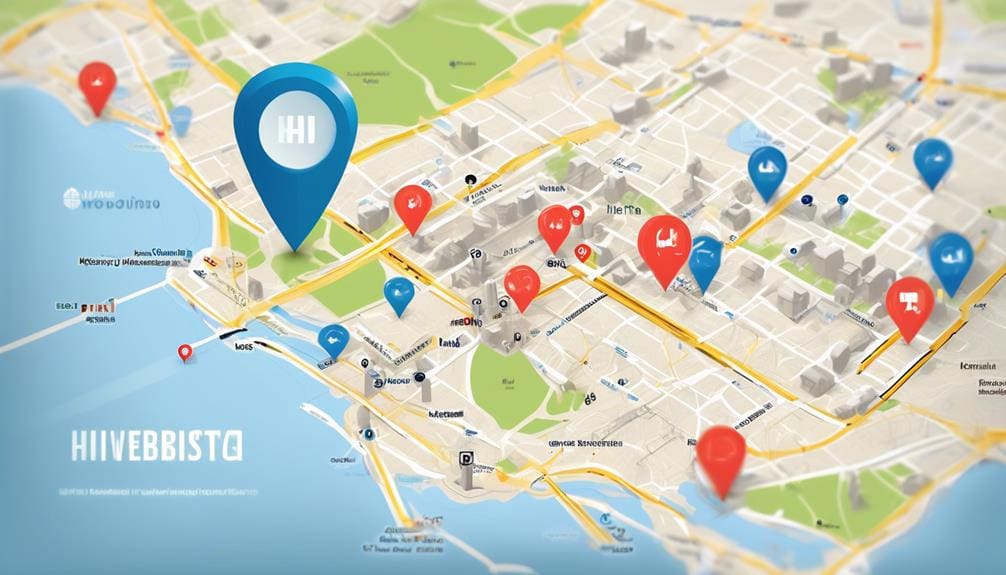In the bustling online landscape, navigating local SEO feels like charting a course through a complex maze of digital storefronts. As we strive to ensure our businesses stand out amidst the virtual bustle, harnessing the power of meta tags becomes increasingly crucial. With 10 carefully crafted strategies, we can elevate our online presence and attract the attention of local customers. From honing in on the most relevant keywords to measuring the impact of our meta tag efforts, these tactics promise to unlock the potential of localized search engine optimization. So, let's uncover the secrets that could propel our businesses to the forefront of local online searches.
Importance of Localized Meta Tags
Enhancing online visibility through location-specific meta tags is a crucial aspect of local SEO strategies, contributing to improved search result rankings and increased customer engagement. Localized meta tags play a vital role in optimizing local business websites, making them more relevant to local searches. By incorporating location-specific keywords, businesses can attract potential customers from their target area, increasing the chances of conversion.
The inclusion of city or region names in title tags is particularly important, as it significantly enhances the website's visibility in local search results. Understanding the specific needs, preferences, and search behavior of the target audience is essential in selecting the right keywords for localized meta tags. This tailored approach improves the website's relevance and ensures that it appears prominently when local users search for relevant products or services.
Measuring the success of a local meta tag strategy involves tracking website traffic, conversion rates, and search engine rankings. These metrics provide valuable insights into the effectiveness of the localized meta tags in driving local customer engagement and improving search result visibility. Incorporating localized meta tags is an indispensable component of a comprehensive local SEO strategy, significantly impacting a business's online presence and success within its local market.
Choosing Relevant Keywords
Understanding the target audience and their specific needs, preferences, and search behavior is essential for choosing relevant keywords for local meta tags. To select the best keywords for local SEO, we need to conduct thorough research using tools to find location-specific keywords that resonate with the local audience. This involves analyzing search trends and understanding the language used by the local community. Incorporating location modifiers such as city names or zip codes in the keywords can make them more specific and relevant to local searches. Additionally, monitoring keyword performance and refining meta tags accordingly is crucial to ensure they align with local search intent. When choosing keywords, it's important to prioritize those with moderate search volume and low competition to improve rankings in local search results. By optimizing meta tags with the right keywords, your website can enhance its visibility and relevance on Google, ultimately driving more local traffic and engagement.
- Conduct thorough research using keyword tools to find location-specific keywords.
- Analyze search trends and understand the language used by the local community.
- Prioritize keywords with moderate search volume and low competition for better local search rankings.
Implementing Meta Tags for Local SEO

When implementing meta tags for local SEO, it's crucial to understand the importance of these tags in maximizing visibility and attracting local customers. We'll explore the significance of incorporating relevant keywords and unique selling points in meta tags to enhance local search relevance. Additionally, we'll discuss the effectiveness of localizing meta tag content with location-specific keywords to boost geographical visibility.
Importance of Meta Tags
To effectively optimize local search engine visibility, businesses must craft meta titles and descriptions with specific character limits and unique selling points. The importance of local SEO meta tags cannot be overstated. Incorporating location-specific keywords and trigger words in meta tags is crucial for attracting potential customers from the target area. Additionally, including city or region names in title tags and meta descriptions can significantly enhance the chances of appearing in local search results. Effective meta descriptions for local markets should be concise, compelling, and include clear calls-to-action to guide users towards desired actions. Measuring the success of local meta tag strategies involves tracking website traffic, conversion rates, and search engine rankings to determine the effectiveness of targeting local audiences. These strategies play a vital role in improving local SEO and increasing visibility in the local market.
Choosing Relevant Keywords
Crafting meta tags with relevant keywords is essential for implementing an effective local SEO strategy, ensuring that businesses can attract potential customers from the target area and improve geographical relevance. When choosing relevant keywords for local SEO, it's crucial to understand the target audience and conduct thorough keyword research. Including location modifiers in meta tags makes the keywords more specific, enhancing their effectiveness for local SEO. Incorporating location-specific keywords in meta tags is vital for improving geographical relevance and attracting local customers. It's also important to keep meta descriptions concise, location-focused, and include unique selling points to stand out in local search results. Monitoring website traffic, conversion rates, and search engine rankings is essential for measuring the success of the local meta tag strategy and making informed decisions. Utilizing title tags, meta descriptions, h1 tags, and alt text for location pages can significantly improve local search visibility and attract potential customers.
Localizing Meta Tag Content
Utilizing location-specific keywords in meta tags is crucial for enhancing geographical relevance and improving local search visibility for businesses. When localizing meta tag content for local SEO, consider these strategies:
- Incorporate City and Region Names: Include the name of the city, region, or neighborhood where the business is located in meta tags to target local customers effectively.
- Use Local Keywords: Integrate keywords that are specific to the local area, such as landmarks, local events, or regional terminology, to resonate with the local audience and improve search engine rankings.
- Create Compelling Calls-to-Action: Craft meta descriptions with clear calls-to-action tailored to the local market, guiding users to take specific actions, such as visiting the store or contacting the business.
Writing Effective Meta Descriptions

When creating effective meta descriptions for local SEO, it's crucial to be specific and location-focused to attract potential customers in your area. Writing effective meta descriptions involves strategically incorporating keywords and location-specific terms within the 150-160 character limit. These descriptions should highlight unique selling points and include a clear call-to-action to entice search engine users to click through to your website. By conveying the value proposition of your business and addressing the needs of local customers, you can differentiate your listing from competitors in search results.
Crafting compelling meta descriptions is a vital aspect of local SEO, as they directly impact click-through rates and website traffic. Therefore, it's essential to measure the success of your meta tag strategy by tracking metrics such as website traffic, conversion rates, and search engine rankings. By analyzing the performance of your meta descriptions, you can refine your approach and continuously optimize your title and description tags to enhance their effectiveness in driving local traffic to your website.
Measuring Meta Tag Strategy Success
To evaluate the effectiveness of our local meta tag strategy, we closely monitor website traffic, conversion rates, and search engine rankings. Here's how we measure the success of our meta tag strategy:
- Website Traffic: An increase in website traffic, particularly from local sources, indicates successful targeting of local audiences. By analyzing the geographic origin of the traffic, we can ensure that our meta tags are effectively drawing in local visitors.
- Conversion Rates: Higher conversion rates demonstrate effective communication of value to the local target audience. By tracking the conversion rates of visitors from local searches, we can gauge how well our meta tags are resonating with and motivating local customers to take action.
- Search Engine Rankings: Monitoring search engine rankings is crucial for measuring visibility and the attraction of potential customers. By tracking our ranking for local-specific keywords, we can assess whether our meta tag strategy is helping us to rank higher for relevant local searches, thereby increasing the visibility of our website.
Local SEO Meta Tag Best Practices

In our experience, incorporating specific location-based keywords and unique selling points into meta tags has proven to be an effective strategy for enhancing local relevance and attracting potential customers in local search results. When implementing local SEO meta tag best practices, it's essential to ensure that page titles and meta descriptions adhere to recommended character limits for optimal visibility. Additionally, writing meta tags to appeal to human readers, not just search engine algorithms, creates engaging and informative snippets.
Below is a table summarizing key best practices for local SEO meta tags:
| Best Practices | Description | Example |
|---|---|---|
| Incorporate Keywords | Include location-specific keywords in meta tags to improve local relevance. | "Best pizza in downtown Seattle" |
| Utilize Unique Selling Points | Highlight unique aspects of the business to attract potential customers in local search results. | "Family-owned Italian restaurant since 1995" |
| Monitor Performance | Track website traffic, conversion rates, and search engine rankings to measure the strategy's success. | Google Analytics, Conversion Tracking |
Applying these best practices can enhance website relevance to local searches and improve visibility in local search results, ultimately driving more targeted traffic and potential customers to the business.
Optimizing Title Tags for Local Search
When it comes to local SEO, optimizing title tags is crucial for boosting visibility and attracting local customers. We can achieve this by strategically including location-based keywords, incorporating the business name, and featuring local phone numbers. These tactics not only enhance local relevance but also improve the chances of appearing in local search results, ultimately driving more traffic and conversions.
Location-Based Keywords
How can location-based keywords be optimized in title tags for local search to enhance geographical relevance and attract local customers? When optimizing title tags for local search, it's crucial to incorporate location-specific keywords to signal relevance to search engines and local users. Here's how to do it effectively:
- Include City Names or Zip Codes: Incorporating specific location modifiers in title tags, such as city names or zip codes, can make them more targeted for local search optimization.
- Use Location-Targeted Meta Descriptions: Craft concise and compelling meta descriptions that are focused on the local area to attract local customers.
- Measure Success with Analytics: Monitor website traffic, conversion rates, and search engine rankings to gauge the effectiveness of the local meta tag strategy.
Business Name Inclusion
To further enhance local search optimization beyond location-based keywords, integrating the business name into title tags is pivotal for increasing visibility and relevance in local search results. When the business name is included in meta tags, it not only helps in brand recognition but also improves the chances of appearing in local search results when users specifically search for local businesses by name. This strategy also contributes to strengthening the association between the business and its location, which is crucial for local SEO. By incorporating the business name in title tags, local businesses can effectively attract website traffic from individuals who are specifically searching for them, thereby increasing their visibility and relevance in the local market. This approach, when combined with location-specific keywords, can significantly bolster the local SEO efforts of businesses.
Local Phone Numbers
Optimizing title tags with local phone numbers is a crucial strategy for boosting local search visibility and connecting businesses with their target audience. When it comes to local SEO, including local phone numbers in title tags can significantly impact search engine optimization efforts. Here's why it's essential:
- Local Relevance: Including a local phone number in title tags enhances the local relevance of the content, signaling to search engines that the business is closely associated with a specific area.
- Improved Visibility: Local phone numbers in title tags can help businesses appear in local search results, increasing visibility to potential customers in the area.
- Enhanced Credibility: Displaying a local phone number can instill trust and credibility with local customers, making it more likely for them to engage with the business.
Incorporating local phone numbers into title tags is a fundamental aspect of local SEO and digital marketing strategies for local businesses.
Crafting Meta Descriptions for Local Markets
Crafting compelling and location-focused meta descriptions is essential for attracting local customers and differentiating from competitors in local search results. When crafting meta descriptions for local markets, it's crucial to incorporate location-specific keywords and unique selling points to stand out. Including a clear call-to-action in meta descriptions can guide local users towards desired actions, such as visiting the store, making a call, or filling out a contact form. Keeping meta descriptions within the recommended 150-160 characters ensures proper display in local search results, maximizing visibility and engagement.
| Key Points | Description |
|---|---|
| Conciseness | Keep meta descriptions brief and impactful to capture the attention of local users. |
| Location-Specific Keywords | Incorporate location-specific keywords to optimize meta descriptions for local search. |
| Unique Selling Points | Highlight what sets your business apart from competitors to attract local customers. |
| Clear Call-to-Action | Include a clear and specific call-to-action to prompt local users to take desired actions. |
| Performance Tracking | Measure the success of the local meta tag strategy through website traffic and conversions. |
Crafting meta descriptions for local markets requires a strategic approach that aligns with the goals of local SEO and location pages. By following these best practices, businesses can enhance their online presence and effectively attract local customers.
Leveraging H1 Tags for Local SEO

Leveraging H1 tags for local SEO involves strategically featuring location and targeted keywords to enhance search relevance for businesses targeting local audiences. When optimizing H1 tags for local SEO, it's essential to incorporate local keywords that reflect the specific geographic area and the products or services offered. This helps to align the website for local searches and improve visibility within the local market. Additionally, including keywords in H1 tags can boost your local search ranking, making it more likely for your website to appear in results when potential customers search for relevant terms in your area.
- Showcase Location: Use H1 tags to prominently display the location of your business, helping search engines understand the geographic relevance of your content.
- Target Local Keywords: Incorporate local keywords into H1 tags to signal the relevance of your website for local searches and attract nearby customers.
- Highlight Unique Selling Points: Leverage H1 tags to showcase unique value propositions tailored to local audiences, encouraging engagement and conversions.
Enhancing Local Search With ALT Text
When it comes to enhancing local search with ALT text, it's crucial to understand the importance of this often overlooked aspect of SEO. Optimizing images with descriptive ALT text that includes location-specific keywords can significantly improve local search relevance. By incorporating local landmarks or identifiers and following best practices for ALT text, businesses can reinforce their relevance in specific geographic areas and attract local customers.
Importance of ALT Text
How can the strategic use of ALT text enhance local search visibility and improve user experience? Incorporating descriptive ALT text with relevant keywords in images is crucial for local SEO success. Here's why ALT text is important for local search:
- Improved Accessibility: ALT text makes visual content accessible to both search engine crawlers and visually impaired users, enhancing website relevance and user experience.
- Enhanced Local Visibility: Using location-specific ALT text can boost visibility in local search results, attracting local customers and driving business growth.
- SEO Relevance: Including ALT text contributes to a well-rounded local SEO strategy, signaling to search engines the context and relevance of images to local keywords.
Optimizing Images for SEO
Enhancing local search visibility through the strategic use of ALT text extends beyond its importance for accessibility and user experience, as it plays a pivotal role in optimizing images for SEO. Incorporating location-specific keywords in image alt text is crucial for improving geographical relevance and visibility in local search results. By including location-specific details and unique selling points, alt text enhances relevance to local searches, attracting potential customers from the target area. It is essential to describe images with concise, compelling, and location-focused content, incorporating city or region names and relevant descriptors for better local search visibility. Monitoring the performance of image alt text and refining it accordingly is necessary to improve local search rankings and attract local customers. This optimization strategy is integral for online businesses targeting a local audience and seeking to enhance their overall search engine optimization efforts.
Best Practices for ALT Text
Descriptive and relevant ALT text is a fundamental component in local SEO strategies, particularly when aiming to enhance visibility in specific geographical areas. When implementing ALT text for local SEO, consider incorporating location-specific keywords to provide context for images related to local events, landmarks, or products and services. Additionally, including the company name, location, and relevant keywords in ALT text can enhance local search relevance. It's crucial to avoid keyword stuffing and instead focus on accurately describing the image for both search engines and visually impaired users. By utilizing ALT text to improve accessibility and enhance user experience, small businesses can positively impact their local SEO efforts, ultimately reaching potential customers more effectively.
Frequently Asked Questions
How Do I Optimize Meta Tags for Seo?
We optimize meta tags for SEO by incorporating relevant keywords into title and description tags. Additionally, we ensure image alt tags and website content align with local directories. This data-driven approach enhances geographical relevance and attracts local customers effectively.
What Is the Best Strategy for Local Seo?
We prioritize local keywords, Google My Business, local citations, customer reviews, geo targeted content, and local link building for effective local SEO. Our data-driven approach ensures high visibility and engagement, leading to mastery in local search.
How Do I Dominate Local Seo?
To dominate local SEO, we prioritize Google My Business, local keywords, citations and backlinks, on-page optimization, mobile optimization, and local directories. Ensuring these elements are optimized and consistent boosts visibility and relevance for local searches.
How Do I Optimize Local Seo?
To optimize local SEO, we focus on using local keywords, Google My Business, local directories, NAP consistency, local link building, and geotagging images. This ensures our website ranks higher in local searches, attracting more potential customers.
